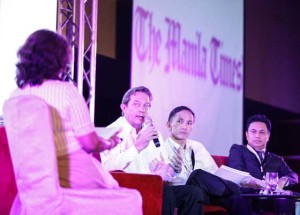THE GOVERNMENT’S policy of “monopolizing” the importation of rice is not helping poor farmers, thus, it does not bode well for the overall objective of achieving rice self-sufficiency and inclusive economic growth, according to World Bank lead economist Rogier Van den Brink.
Van den Brink, one of the resource speakers at The Manila Times’ 3rd Business Forum held at the New World Manila Bay Hotel, said the existing strict government policy on rice importation “affects the entire country.”
“The Philippines can be (rice) self-sufficient (but because of) monopolizing rice importation… it has failed,” the Bank executive claimed as he fielded questions from forum participants.
He said the policy will not work to increase the net income of farmers or to reduce the retail prices of the commodity. What the government should do, he explained, is to embark on programs that will modernize the agriculture sector.
In his presentation, Van den Brink noted that the current rice policy of self-sufficiency is not achieved because a “significant gap remains between production and consumption.” Likewise, the policy of “buying high” from farmers and “selling low to the poor” is far-fetched from the actual performance.
“Purchases are too small scale to make a significant impact and only 11.5 percent of rice purchases by the poor was NFA (National Food Authority) rice,” he pointed out.
The World Bank expert, a lead economist in the poverty reduction and economic management department of the East Asia and Pacific Region, also noted that the rice marketing system is underdeveloped.
“The widening gap between farm gate prices and retail prices suggests increasing inefficiency,” Van den Brink stressed.
To correct these flaws, he suggested that government “open the import regime of food commodities, in particular rice” by removing the “quantitative rice import restrictions and its licensing system.”
“Urgently, so that traders have sufficient time to import, to avoid domestic food price increases,” he further explained, adding that retail food prices can be monitored throughout the country through “crowd sourcing.”
Van den Brink pointed that in January 2015, a kilogram of rice in the Philippines was worth P35 while the Thais and Vietnamese paid only the equivalent of P15 per kilo.
For the medium term, he suggested that after the removal of the quantitative import restrictions and the tarification of the quotas, tariffs should be “progressively reduced over time.”
The WB official said there should be more investments in agricultural productivity, specifically on research and development, agricultural extension, rural infrastructure such as roads irrigation and electrification; secure property rights; and farmers’ health and education.



